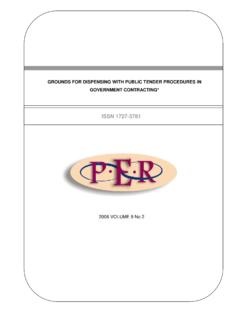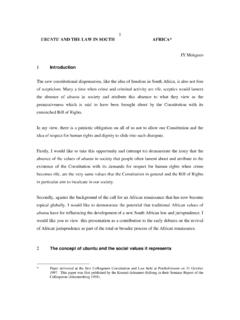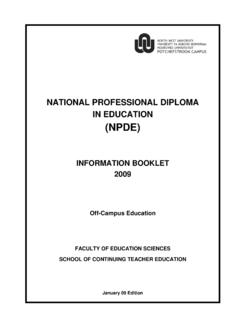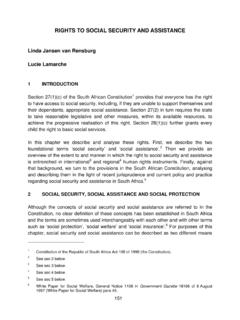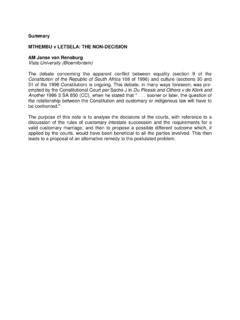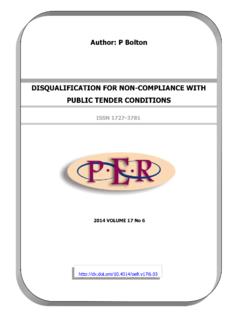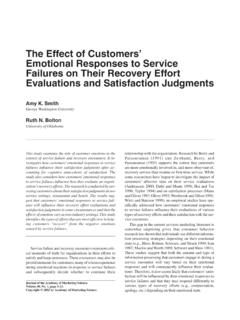Transcription of GROUNDS FOR DISPENSING WITH PUBLIC TENDER …
1 P bolton PER 2006(2) 1/38 GROUNDS FOR DISPENSING WITH PUBLIC TENDER PROCEDURES IN GOVERNMENT CONTRACTING* P bolton ** 1 Introduction Procurement is generally described as the function of purchasing goods and services from an outside In South Africa, PUBLIC sector procurement or government procurement is estimated to amount to approximately 14% of gross domestic product (GDP).2 In the United Kingdom, it is estimated that the total value of PUBLIC procurement (excluding the procurement of PUBLIC corporations) was 117 billion in 2002/33 and in the United States, the monetary value of PUBLIC sector contracts given to the private sector is estimated to be about 15% of Government procurement is, therefore, of huge economic significance. Government procurement is, moreover, of major importance for the economic development of a country, particularly in respect of projects involving infrastructure and telecommunication.
2 A government can use its procurement power to promote social and policy objectives by, for example, promoting the development of previously disadvantaged groups. The size and volume of government procurement does, however, give rise to considerable * This article is based on sections of the author s unpublished doctoral thesis, The Legal Regulation of Government Procurement in South Africa (University of the Western Cape, 2005). ** Senior Lecturer in Law, University of the Western Cape. The financial support of DAAD (Deutscher Akademischer Austausch Dienst / German Academic Exchange Service) and the Research Development Office of the University of the Western Cape in 2004/2005 is gratefully acknowledged. I am also indebted to Julia Sloth-Nielsen and Tobias Van Reenen for their comments on an earlier draft of this paper.
3 1 Arrowsmith et al. Regulating PUBLIC Procurement 1. Collins English Dictionary 1294 similarly defines procurement as the act of buying . In the South African context, as is argued in greater detail elsewhere ( bolton Government Procurement ch 3, par ), the word 'procurement', as contained in the heading of s 217 of the Constitution of the Republic of South Africa 1996 (the Constitution) should be given a wide interpretation. Procurement, in the South African context, should be understood as referring to instances when the government acquires goods or services and when it sells or lets assets. 2 Mkhize No title . 3 Arrowsmith PUBLIC and Utilities Procurement par (n omitted). 4 Amos 2005 12 May. P bolton PER 2006(2) 2/38 potential for corruption. Both contractors and PUBLIC officials may resort to corrupt practices, and this may be for personal or political reasons.
4 Whatever the underlying reasons, corruption undermines the attainment of value for money in government contracting, the fair treatment of contractors and the use of procurement as a policy tool. The South African Constitution provides that when organs of state procure goods or services, they must comply with five principles: fairness, equity, transparency, competitiveness and In short,6 this means that organs of state should make use of competition when procuring goods or services. They should 'shop around' and attract the maximum number of contractors who will participate in such The aim should be to ensure the attainment of value for money PUBLIC money should be spent in an effective and efficient Those who participate in competitions should also be treated fairly and without Thus, all contracting parties should have equal access to competition; some contractors should not be afforded more time for the preparation and submission of quotes or tenders than others; and the same information should be made available to all contracting parties.
5 Government procurement procedures should further be transparent,10 meaning ' PUBLIC ' or 'open'.11 Thus, when organs of state procure goods or services, this should not be done behind closed doors. Procurement information should be generally available; there should be publication of general procurement rules and practices; government contracts should be advertised; contractors should be able to access information on government contract awards; and organs of 5 S 217(1). 6 For detailed discussion, see bolton Government Procurement ch 3, par 4. 7 On 'competitiveness' and competition, see Collins English Dictionary 345; OED 28 Oct; Burton Legal Thesaurus 97; Goyder EC Competition Law 8. 8 On 'cost-effectiveness', see Collins English Dictionary 380 and 524; s 33(3)(c), 195(1)(b) and 215(1) of the Constitution.
6 The COED 25 Jan also defines the word 'cost-effective' as working productively with minimum wasted effort or expense . 9 On 'fairness', see Collins English Dictionary 586; Claassen Legal Words and Phrases 228; Burton Legal Thesaurus 228; OED 28 Oct; COED 25 Jan. 10 S 217(1) of the Constitution. 11 Burton Legal Thesaurus 515. P bolton PER 2006(2) 3/38 state should disclose the criteria that will be applied in selecting a winning Depending on the nature and value of a particular contract, the use of a PUBLIC call for tenders can generally be regarded as the best way to ensure compliance with the principles in section 217(1) of the Constitution, that is, fairness, equity, transparency, competitiveness and By nature, a PUBLIC call for tenders is open; it assists in the prevention of fraud or favouritism; and ensures that the maximum number of contractors is approached to participate in government procurement procedures, thus affording an equal opportunity to all prospective contractors to contract with the government.
7 An organ of state is also in a position to compare prices and quality and can choose to contract with whoever offers the best deal. Most legislation accordingly proceeds on the basis that procurement takes place by way of As a general rule, legislation prescribes that contracts with a high value (above R200 000) are subject to PUBLIC TENDER procedures. There may, however, be instances when the circumstances of a particular case make the use of a PUBLIC call for tenders inappropriate, regardless of the high value of the contract. Provision is, therefore, made in legislation for exceptions to the prescribed use of tendering. Since tendering is generally the best method to employ to ensure compliance with the principles in section 217(1) of the Constitution, it is important for there to be sufficient guidance on the non-use of TENDER procedures.
8 The aim of this article is to analyse the legislation providing for exceptions to the use of tendering and to make recommendations on how 12 Evenett and Hoekman Transparency 272; Arrowsmith 1998 ICLQ. 13 A PUBLIC call for tenders is also generally referred to as 'tendering', 'competitive tendering', 'bidding', 'competitive bidding', 'sealed bidding', 'open tendering', 'a call for competition', ' PUBLIC advertisement' or 'a call for tenders'. For the purposes of this article, reference will primarily be made to the terms 'tendering' and 'competitive bidding'. In practice, however, the different terms are often used interchangeably. 14 See, , the Preferential Procurement Policy Framework Act 5 of 2000 (Procurement Act) and the Regulations thereto Preferential Procurement Regulations GG No 22549 of 10 August 2001. These (2001) Regulations are currently (30 April 2006) in the process of being redrafted Preferential Procurement Policy Framework Act, 2000 (Act 5 of 2000): Draft Preferential Procurement Regulations GG No 26863 of 4 October 2004.
9 P bolton PER 2006(2) 4/38 some of the legislative provisions should be interpreted in order to align them with the principles in section 217(1) of the Constitution. First, the different ways in which legislation makes provision for the non-use of tendering will be enquired into. Guidance will then be provided on how certain legislative provisions should be interpreted to ensure compliance with section 217(1) of the Constitution. In doing so, reference will be made to international instruments dealing with government procurement and, specifically, the non-use of TENDER Readers are warned not to expect extensive reference to applicable case law. The reason for this is that in those instances where organs of state fail to make use of PUBLIC TENDER procedures, affected parties are seldom aware of this. Also, even where decisions not to use TENDER procedures are known to affected parties, they are generally unlikely to experience such an instant or direct sense of unfairness as with decisions made in the course of PUBLIC TENDER procedures.
10 Case law dealing with the non-use of PUBLIC TENDER procedures is accordingly scarce, especially in the South African context. As far as possible, however, use will be made of practical examples. 2 Exceptions as provided for in legislation Overview of legislation 15 , United States Federal Acquisition Regulations (US FAR); the UNCITRAL 28 Oct; the European Community s new PUBLIC Procurement Directives (Directive 2004/18/EC on the coordination of procedures for the award of PUBLIC works contracts, PUBLIC supply contracts and PUBLIC service contracts [2004] Official Journal of the European Union L 134/114 (EC PUBLIC Sector Directive); and Directive 2004/17/EC on coordinating the procurement procedures of entities operating in the water, energy, transport and postal services sectors [2004] Official Journal of the European Union L 134/1 (EC PUBLIC Utilities Directive)); the WTO GPA 28 Oct; and the new Polish PUBLIC Procurement Act.
